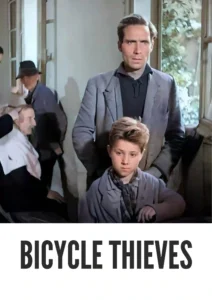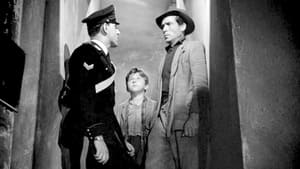Video Sources 0 Views
- Watch trailer
- Bicycle Thieves 1948 Colorized


Download Bicycle Thieves (1948) Colorized HD | Vittorio De Sica | Italian Neorealism Drama
Synopsis
Table of Contents
Toggle
Step into the world of Italian neorealism with Bicycle Thieves, a timeless drama from 1948 that has now been beautifully colorized for a fresh viewing experience. Directed by Vittorio De Sica, this film captures the struggles of post-war Italy through the eyes of a desperate father searching for his stolen bicycle, essential for his job and survival. This HD download offers classic film lovers and newcomers alike an opportunity to appreciate a cornerstone of cinema history in a new light.
Bicycle Thieves follows Antonio Ricci (Lamberto Maggiorani), an unemployed man who finally secures a job that requires a bicycle. However, his excitement turns to despair when his bike is stolen on his first day of work. Accompanied by his young son, Bruno (Enzo Staiola), Antonio embarks on a desperate quest through the streets of Rome to recover the stolen bicycle. The film poignantly explores themes of poverty, family bonds, and the impact of societal struggles on personal lives.As Antonio and Bruno navigate their city, they encounter various characters who reflect the harsh realities of their environment. The father-son duo’s journey becomes not just about retrieving the bicycle but also about maintaining hope and dignity in an unforgiving world. The film culminates in a heart-wrenching conclusion that leaves viewers reflecting on the nature of desperation and resilience.
The film features a remarkable cast that brings this emotional narrative to life:
- Lamberto Maggiorani as Antonio Ricci
- Enzo Staiola as Bruno Ricci
- Gino Saltamerenda as The Thief
- Vittorio Antonucci as The Policeman
- Carla Cattaneo as A Woman
Bicycle Thieves is categorized as an Italian neorealism drama, characterized by its focus on everyday struggles and social issues. The film’s realistic portrayal of life in post-war Italy, combined with its emotional depth, makes it a compelling watch for anyone interested in human stories.
Released in 1948, Bicycle Thieves is considered one of the defining films of Italian neorealism, a movement that emerged after World War II emphasizing authenticity and social commentary. This film marked a significant shift in cinematic storytelling, moving away from glamorous portrayals to focus on real-life challenges faced by ordinary people. De Sica’s direction and the use of non-professional actors contributed to the film’s raw emotional power and lasting impact on global cinema.
This colorized version of Bicycle Thieves has been meticulously restored using advanced digital techniques to enhance its visual appeal while preserving the original narrative’s emotional weight. The colorization process involved analyzing the grayscale tones of the original footage and carefully assigning colors to each scene. This modern adaptation allows new audiences to engage with this classic film while sparking discussions about its themes and relevance today.
- : Vittorio De Sica
- : Cesare Zavattini
- : The novel by Luigi Bartolini
- : Carlo Montuori
- : Eraldo Da Roma
- : Produzione De Sica
- : Lux Film
- : 93 minutes
- : MP4
- : HD (1080p)
- : Compatible with most devices, including smartphones, tablets, computers, and smart TVs.
Bicycle Thieves is often hailed as one of the greatest films ever made, receiving critical acclaim for its powerful storytelling and realistic portrayal of life’s hardships. Its influence extends beyond Italian cinema, inspiring filmmakers worldwide to explore themes of social justice and human resilience. As an essential piece of cinematic history, it continues to resonate with audiences today.
- : What is Bicycle Thieves about?
- A: Bicycle Thieves tells the story of a father searching for his stolen bicycle in post-war Rome while navigating poverty and despair.
- : Is Bicycle Thieves (1948) considered an important film?
- A: Yes, it is regarded as one of the most significant films in Italian neorealism and has influenced countless filmmakers.
- : Is this version of Bicycle Thieves colorized?
- A: Yes, this version has been professionally colorized to enhance the viewing experience.
- : What makes Bicycle Thieves interesting for film enthusiasts?
- A: It offers profound insights into human struggles and societal issues while showcasing Vittorio De Sica’s masterful storytelling.
- : What is the download format?
- A: The download format is MP4, compatible with most devices.
- : What resolution is the download?
- A: The resolution is HD (1080p), ensuring high-quality viewing.
Watch Bicycle Thieves Today!


















